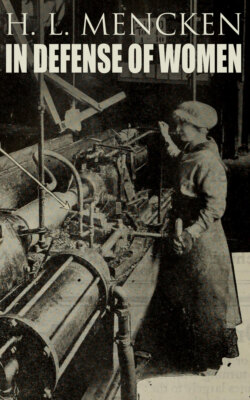Читать книгу In Defense of Women - H. L. Mencken - Страница 14
9. MEN AS AESTHETES
ОглавлениеMen show no such sagacious apprehension of the relatively feeble loveliness of the human frame. The most effective lure that a woman can hold out to a man is the lure of what he fatuously conceives to be her beauty. This so-called beauty, of course, is almost always a pure illusion. The female body, even at its best is very defective in form; it has harsh curves and very clumsily distributed masses; compared to it the average milk-jug, or even cuspidor, is a thing of intelligent and gratifying design—in brief, an objet d'art. The fact was curiously (and humorously) display during the late war, when great numbers of women in all the belligerent countries began putting on uniforms. Instantly they appeared in public in their grotesque burlesques of the official garb of aviators, elevator boys, bus conductors, train guards, and so on, their deplorable deficiency in design was unescapably revealed. A man, save he be fat, i.e., of womanish contours, usually looks better in uniform than in mufti; the tight lines set off his figure. But a woman is at once given away: she look like a dumbbell run over by an express train. Below the neck by the bow and below the waist astern there are two masses that simply refuse to fit into a balanced composition. Viewed from the side, she presents an exaggerated S bisected by an imperfect straight line, and so she inevitably suggests a drunken dollar-mark. Her ordinary clothing cunningly conceals this fundamental imperfection. It swathes those impossible masses in draperies soothingly uncertain of outline. But putting her into uniform is like stripping her. Instantly all her alleged beauty vanishes.
Moreover, it is extremely rare to find a woman who shows even the modest sightliness that her sex is theoretically capable of; it is only the rare beauty who is even tolerable. The average woman, until art comes to her aid, is ungraceful, misshapen, badly calved and crudely articulated, even for a woman. If she has a good torso, she is almost sure to be bow-legged. If she has good legs, she is almost sure to have bad teeth. If she has good teeth, she is almost sure to have scrawny hands, or muddy eyes, or hair like oakum, or no chin. A woman who meets fair tests all 'round is so uncommon that she becomes a sort of marvel, and usually gains a livelihood by exhibiting herself as such, either on the stage, in the half-world, or as the private jewel of some wealthy connoisseur.
But this lack of genuine beauty in women lays on them no practical disadvantage in the primary business of their sex, for its effects are more than overborne by the emotional suggestibility, the herculean capacity for illusion, the almost total absence of critical sense of men. Men do not demand genuine beauty, even in the most modest doses; they are quite content with the mere appearance of beauty. That is to say, they show no talent whatever for differentiating between the artificial and the real. A film of face powder, skilfully applied, is as satisfying to them as an epidermis of damask. The hair of a dead Chinaman, artfully dressed and dyed, gives them as much delight as the authentic tresses of Venus. A false hip intrigues them as effectively as the soundest one of living fascia. A pretty frock fetches them quite as surely and securely as lovely legs, shoulders, hands or eyes. In brief, they estimate women, and hence acquire their wives, by reckoning up purely superficial aspects, which is just as intelligent as estimating an egg by purely superficial aspects. They never go behind the returns; it never occurs to them to analyze the impressions they receive. The result is that many a man, deceived by such paltry sophistications, never really sees his wife—that if, as God is supposed to see her, and as the embalmer will see her—until they have been married for years. All the tricks may be infantile and obvious, but in the face of so naive a spectator the temptation to continue practising them is irresistible. A trained nurse tells me that even when undergoing the extreme discomforts of parturition the great majority of women continue to modify their complexions with pulverized talcs, and to give thought to the arrangement of their hair. Such transparent devices, to be sure, reduce the psychologist to a sour sort of mirth, and yet it must be plain that they suffice to entrap and make fools of men, even the most discreet. I know of no man, indeed, who is wholly resistant to female beauty, and I know of no man, even among those engaged professionally by aesthetic problems, who habitually and automatically distinguishes the genuine, from the imitation. He may do it now and then; he may even preen himself upon his unusual discrimination; but given the right woman and the right stage setting, and he will be deceived almost as readily as a yokel fresh from the cabbage-field.
